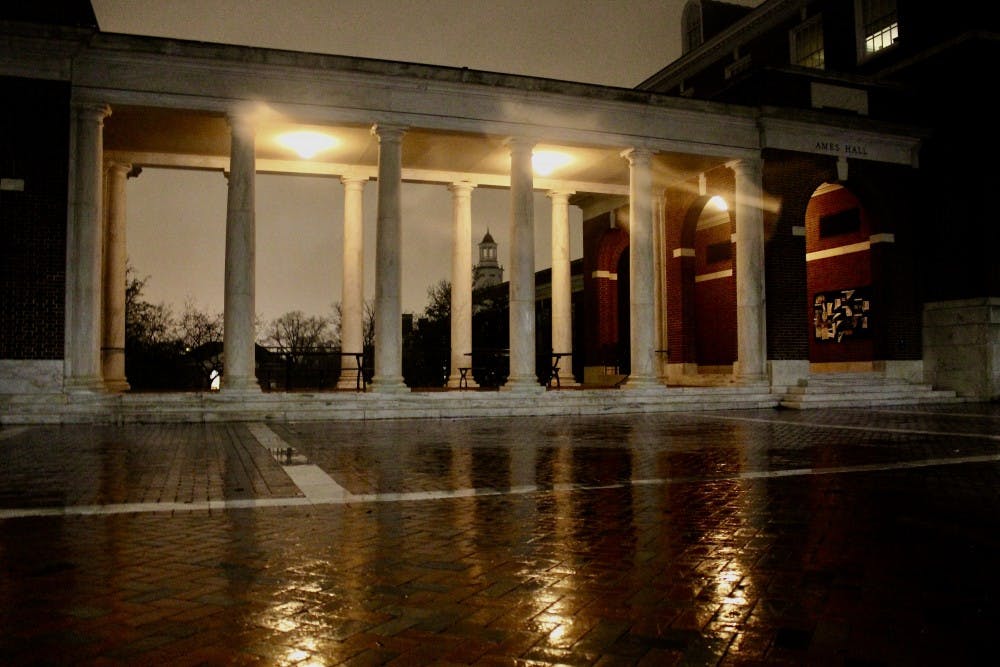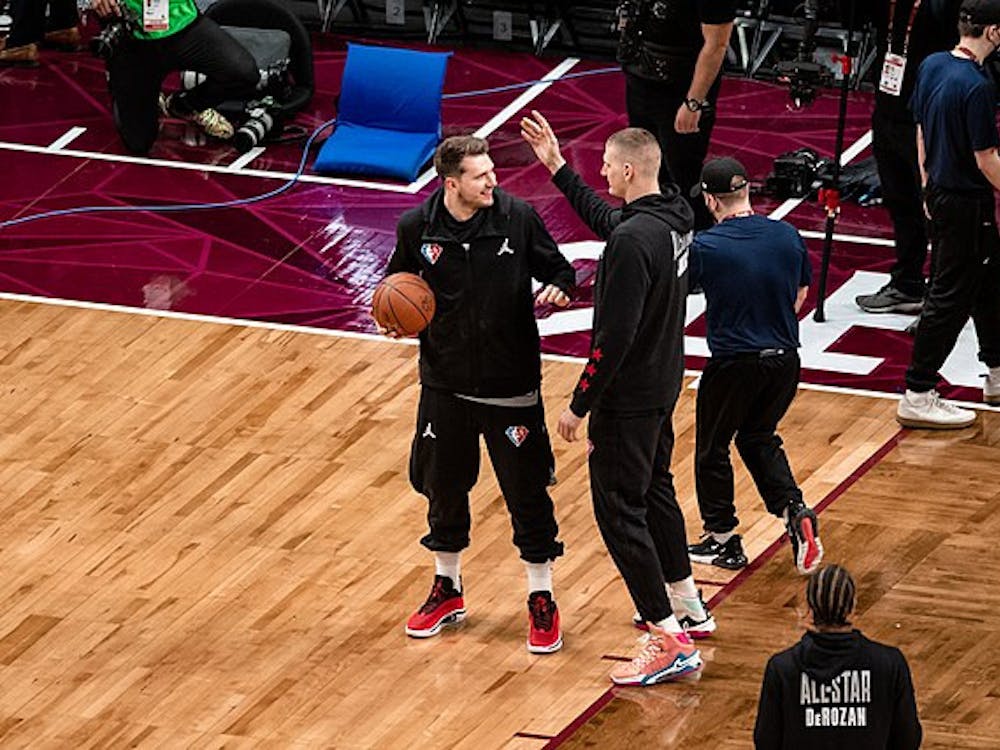At the start of the semester, The News-Letter set to work on an in-depth feature about the Office of Institutional Equity (OIE) and its handling of sexual assault and harassment cases. Over the past several months, eight survivors came forward to share their stories with our reporter. We would like to recognize those eight individuals who bravely shared their stories with The News-Letter.
The accounts referenced in this editorial are explained in greater detail in our front page news coverage. We urge you to read that article before reading our editorial.
We were not expecting OIE to be perfect, but we were also not expecting to find such severe and systemic issues. The University promotes OIE as a source of support for students experiencing any sort of discrimination, with a strong focus on assisting survivors of sexual assault. This promise is made to students in their first week on campus and throughout our time here at Hopkins. For example, last December in an email from President Daniels and other top administrators, they encouraged survivors to report sexual misconduct, and cited OIE as the place to do so.
“The Office of Institutional Equity...offer[s] supportive resources and [is] equipped to investigate allegations carefully and fairly, for all involved,” they wrote in the email.
As our news article highlights, though, that does not always hold true. Seven of the eight stories revealed an alarming number of inconsistencies in OIE practices. OIE fails to abide by their own standards and those set out by the University, as well as the Obama-era Dear Colleague standards implemented as part of Title IX. Procedures for handling sexual assault reports are delineated on OIE’s website and in the University’s Sexual Misconduct Policy, a 32-page document last updated in 2015. However, there are discrepancies between the two policies, and neither are consistent with the experiences of the survivors who spoke to The News-Letter.
Currently, both policies allow for significant variability in what actions are taken and in how long the process takes. We understand that different cases present different circumstances, but OIE’s current baseline procedures make it difficult to hold them accountable.
Survivors need to know what resources are available to them, how long an investigation may take and what consequences could affect the parties involved. OIE must be more transparent when it deviates from its general policies. In many cases, OIE suggests or enacts a no-contact order to protect the survivor from the accused perpetrator. According to the Sexual Assault Response and Prevention office website, a no-contact order requires “no further communication — in person or otherwise.” However, the terms and conditions of a no-contact order can vary.
In the cases of Anthony Flores, April Kim, Beth, Melissa and Lilly, OIE used a no-contact order as its first course of action. The survivors’ experiences with the orders were wildly different. Beth refused it for fear of retaliation from the accused perpetrator as they would know who requested the order. Flores had a positive experience in which the respondent obeyed the order, so Flores chose not to open an investigation.
In Melissa’s case, the accused perpetrator continually broke the no-contact order, so OIE increased the required distance between them. The perpetrator still did not comply, and he faced no consequences. There is no outlined punishment for such a violation, and the Misconduct Policy simply states that it “may result in disciplinary consequences pursuant to applicable procedures.”
OIE’s handling of evidence in sexual assault cases is also unacceptably inconsistent. The University’s Sexual Misconduct Policy recommends that survivors preserve evidence by saving any text messages or social media interactions and by receiving a forensic exam as soon as possible after an assault. The Policy states that OIE’s Equity Compliance Investigators (ECIs) will take all evidence into account, including statements from the survivor, perpetrator and any witnesses. After her assault, Lee went to the hospital for a sexual assault forensic evidence (SAFE) kit that showed evidence of marijuana in her bloodstream. Lee asked her investigator if they needed the SAFE kit, and they told her that it was her decision. She thought OIE would believe her when she said she was inebriated, so she did not get the kit to present for analysis.
Lee said that OIE ruled in favor of the perpetrator because they said there was not enough evidence that she had been inebriated. When Kim went through OIE’s investigative process, she did not know she could provide her own witnesses. A friend emailed a statement corroborating her story, and OIE never followed up with him.
OIE’s promise that cases will typically be closed in fewer than 60 days is one of the most egregious inconsistencies. OIE’s website defines the beginning of the 60 days as the time at which the survivor files a report. Meanwhile, the University’s Misconduct Policy defines the beginning of the 60 days as the start of an investigation. Both procedures state that OIE will inform survivors if the process is expected to take longer than 60 days.
In an email to our reporter, Title IX Coordinator Joy Gaslevic affirmed the University’s commitment to closing cases within 60 days.
“OIE resolves a majority of Title IX related cases within this 60-day goal,” she wrote.
At least two and a half months passed before OIE emailed Beth to let her know her case was closed. Melissa’s case began in December 2016 and was not completed until the end of 2017. Lilly’s case lasted 161 days. Lee’s case took over four months.
In all of these cases, the survivors did receive an email when their cases surpassed the 60 day mark. However, these emails rarely provide a clear timeframe going forward and survivors are not kept adequately informed about the progress of their case or how much longer it might take. The survivors should have received clear and frequent updates. They should not be left in the dark for months.
Flores’ case was closed within the 60-day mark. However, he chose not to open an investigation. It is unclear from the language of the policies whether Flores’ case would count towards the 60-day goal. Based on the wording of the Misconduct Policy, this case would not qualify.OIE needs to clearly define what these 60 days refer to. They need to define what an open case is and what a closed case is.
They also need more concrete statistics beyond Gaslevic’s word that OIE resolves most cases within the timeline. Currently, OIE does not release any statistics about how many reports are made, how many investigations are opened or how long an average investigation takes. When our reporter asked about the lack of such statistics, Gaslevic cited precedent as the reason why nothing has been released.
“We don’t do it currently, I think just because it’s not been done yet,” she said.
The fact that there are no statistics is appalling. Issues presented by the survivors we interviewed are extremely difficult to contextualize within OIE as a whole without these statistics. What we know from most of the individuals who came forward paints a dark story, but we do not know how widespread these issues are.
Much of the inconsistency in how OIE handles cases stems from an understaffed office. There are currently 12 people tasked with addressing reports from students, faculty and staff at all nine Hopkins schools. It is impossible for such a small office to treat every case with the respect and time it deserves and the University needs to take immediate and substantive steps to address this.
That being said, understaffing does not justify the inconsistencies in how OIE employees have treated students. Training procedures are likely to blame. Currently, the description of training that OIE staffers is vague and unsatisfactory.
The Sexual Misconduct Policy simply states that staffers “at a minimum, receive annual training on issues related to sexual misconduct and on how to conduct an investigation and hearing that protects the safety of victims and promotes accountability.” We do not know what this training looks like or how adequately it prepares employees to work with and for students. Training procedures need to be more clearly defined and focus on not alienating survivors who come forward. It’s vital that staffers treat students with dignity and respect and that they make judgements based on the facts of a case rather than on an assessment of a survivor’s character. Melissa said that the investigator assigned to her case wrote in the final report that “a reasonable person in the same situation would not be scared for their safety.”
We question how and why the term “reasonable person” made it into this investigative report in the first place. This language is not useful to a substantive evaluation of a case, nor is it respectful. It’s completely unacceptable to use such rhetoric in an official report and cannot occur again.Unfortunately, this is not the only instance we have heard of OIE staff treating survivors poorly. Lee described feeling like OIE was trying to trap her into admitting she wanted to have consensual sex with the accused. Beth said that when she went in to report her case, the officer across from her did not look up from their desk and openly admitted “to be honest, we don’t even look at [anonymous reports].”
It goes without saying that all of this behavior is unacceptable. It is horrendous that a student walked away from OIE feeling as though anonymous reports of sexual assault are not taken seriously. OIE should be committed to helping students resolve these cases and taking their reports seriously.
Especially in light of this incompetence, students need confidential resources they can turn to. Some students are only familiar with the Interfaith Center and the Counseling Center. Survivors need access to more University options, all of which should be well-publicized.
There are a number of mandated reporters students can talk to, but they are required to file a report and share what students say with OIE. Mandated reporters are not always aware of their responsibility or of how much they are obligated to reveal. Students need to know who the mandated reporters are and how much the reporters are required to share with OIE, so survivors can make informed decisions about who to talk to.
Survivors do not have sufficient information about any part of the process of bringing an assault or harassment case to OIE. They do not know who they can talk to confidentially or otherwise, and they don’t have a clear idea of what to expect from reporting their experience. We find these circumstances unacceptable, especially in 2018.
We live in a time when more people are coming forward and sharing their stories of sexual assault and harassment. The #MeToo Movement has had a profound impact on encouraging survivors to raise their voices, and this has altered the landscape of reporting sexual misconduct for the better.
Progress at Hopkins will grind to a halt if institutions like OIE do not improve. More people are seeking justice, but that will stop if OIE continues to mishandle cases and exhibit a lack of transparency. If the picture painted by these survivors’ stories persists, people will stop reporting their experiences to OIE — survivors will continue to not get the closure or the justice they deserve.
Correction: The printed version of this article incorrectly asserted that OIE did not notify students if their cases were going to take longer than 60 days to investigate.
The original version of this article stated that current confidential resources at the University are limited to only the Interfaith Center and the Counseling Center. Other confidential resources include the Sexual Assault Helpline, the Student Health and Wellness Center, the Johns Hopkins Student Assistance Program and University Health Services.
The News-Letter regrets these errors.























Please note All comments are eligible for publication in The News-Letter.